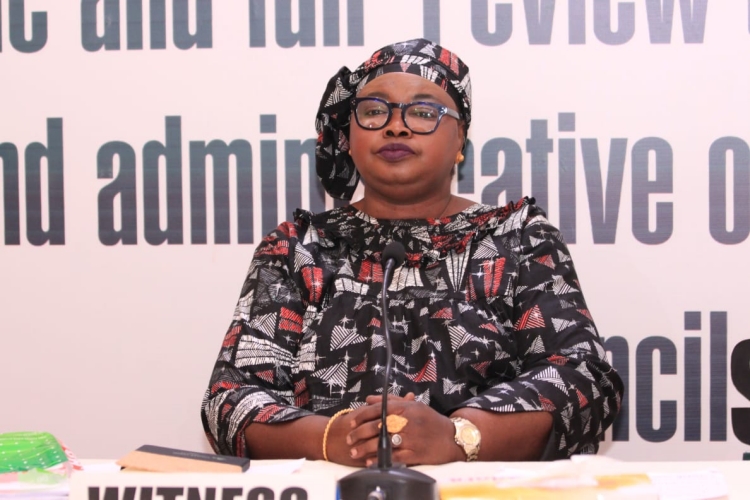Gambiaj.com – (BANJUL, The Gambia) – Banjul Mayor Rohey Malick Lowe told the Local Government Commission of Inquiry on Tuesday that real financial authority at the Banjul City Council (BCC) lies not with the elected mayor but with the Chief Executive Officer (CEO), a claim that has raised serious concerns about the balance of power, legality, and governance in the capital’s local administration.
Testifying under oath on 13 May 2025, Mayor Lowe described her role in financial matters as largely ceremonial, stating that she can only offer suggestions while the CEO holds the final say on expenditure.
“The CEO has the exclusive power to make expenditures. He can choose not to adhere to my advice. I can tell him to do this, and he says no,” she testified.
Her remarks came during a detailed hearing led by Commission Lead Counsel Patrick Gomez, where she responded to questions on council nominations, strategic planning, committee formation, and legal responsibilities. Lowe appeared before the Commission with a six-page written statement dated 5 March 2025, which was admitted into evidence.
Elected but Powerless?
Pressed repeatedly by Counsel Gomez on her powers as an elected official, Mayor Lowe insisted that mayors in The Gambia lack meaningful authority. “I do not think mayors in The Gambia have power,” she said. “The mayor cannot discipline, promote, demote, or take any decision against any person. The mayor cannot spend anything.”
This interpretation, Gomez countered, conflicts with the Local Government Act, which grants executive powers to elected mayors to oversee local councils and ensure lawful governance. “That is not what the law provides. You have power, too,” Gomez told her.
Mayor Lowe’s testimony revealed significant administrative lapses and knowledge gaps. She admitted to limited understanding of key financial governance tools like the Finance and Audit Act and the Financial Manual. “I do not concentrate on them too much because they deal with finance, administration, and audit,” she said, adding, “I am not a master in that.”
She said she relied primarily on the Local Government Act and the “good practice” of former mayors for guidance. When asked to define “good practice,” Lowe cited discretionary spending on religious groups, scholarships, and sports organizations—items that she said were included in the council’s annual budgets.
Further scrutiny exposed poor documentation practices at BCC. Mayor Lowe acknowledged the existence of four council committees—Finance, Establishment and Appointment, Youths and Sports, and a fourth she could not recall—but was unable to produce records explaining how members were appointed or what criteria were used.
Confusion Over Nominations and Planning
The mayor also faced questions about the nomination process for council members. She initially claimed to have nominated four councillors—Anne Secka, Fintong Njie, Abdoulie Krubally, and Basiru Ndow—but later stated that, for example, the youth representative was selected by local youth organizations. She could not recall how the others were chosen.
The Commission instructed her to provide documentary evidence, including nomination letters and ministry confirmations, to clarify the process.
On the council’s development agenda, Lowe said a Strategic Plan and corresponding Action Plan were created in 2018, but she could not recall the duration or specifics of implementation. The Commission asked her to submit copies of the documents, noting that such plans are vital for setting priorities and evaluating progress.
A Broader Pattern
Mayor Lowe’s claims echo those made by other local leaders appearing before the Commission, many of whom have described their roles as constrained by the dominance of administrative officials.
The Inquiry, launched to investigate systemic weaknesses in local government operations, has highlighted the apparent marginalization of elected leaders by powerful CEOs and senior bureaucrats.
Throughout her testimony, Lowe maintained that the operational authority of the BCC resided with the CEO, not the mayor. When Gomez challenged this view, she replied, “When you say Finance and Audit Act, it is about money,” brushing aside broader governance implications. “Yes. I am not a master in that.”
The Commission has directed Mayor Lowe to return with supporting documentation, including nomination records, strategic and action plans, and letters confirming ministerial approval of council appointments.
These records are expected to clarify whether procedural, legal, and administrative standards were followed under her leadership.
As the inquiry progresses, the mayor’s testimony has added to a growing narrative of bureaucratic dominance and elected disempowerment in The Gambia’s local governance system in which professional administrators—particularly the CEO—are the de facto decision-makers, even in areas where legislation gives the elected mayor a defined leadership role.
Whether these revelations lead to reform—or confirm a deepening institutional malaise—now lies in the Commission’s final recommendations.










